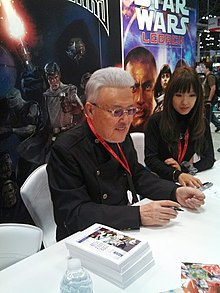

| Kazuo Koike
小池 一夫
| |
|---|---|

Koike at New York Comic Con, 2013
| |
| Born | (1936-05-08)May 8, 1936 Daisen, Akita, Japan |
| Died | April 17, 2019(2019-04-17) (aged 82) |
| Area(s) | Writer |
Notable works | Lone Wolf and Cub Lady Snowblood Crying Freeman |
| Awards | Hall of Fame Eisner Award (2004) |
| Part of a series on |
| Anime and manga |
|---|
 |
|
Anime |
|
Manga |
|
Demographic groups |
|
|
|
People |
|
|
|
General |
|
|
|
|
Kazuo Koike (小池 一夫, Koike Kazuo, May 8, 1936 – April 17, 2019) was a prolific Japanese manga writer (gensakusha), novelist, screenwriter, lyricist and entrepreneur. He is best known for his violent, artful seinen manga, notably Lone Wolf and Cub (with Goseki Kojima, 1970–6), Lady Snowblood (with Kazuo Kamimura, 1972–3) and Crying Freeman (with Ryoichi Ikegami, 1986–8), which – along with their numerous media adaptations − have been credited for their influence on the international growth of Japanese popular culture.
Early in Koike's career, he studied under Takao Saito (the creator of Golgo 13), and served as a writer on the series.
Koike, along with artist Goseki Kojima, made the manga Kozure Okami (Lone Wolf and Cub), and Koike also contributed to the scripts for the 1970s film adaptations of the series, which starred famous Japanese actor Tomisaburo Wakayama. In 1992 he himself produced a Lone Wolf and Cub's film Lone Wolf and Cub: Final Conflict which starred Masakazu Tamura.[1] Koike and Kojima became known as the "Golden Duo" because of the success of Lone Wolf and Cub.
Another series written by Koike, Crying Freeman, which was illustrated by Ryoichi Ikegami, was adapted into a 1995 live-action film by French director Christophe Gans. In addition to his more violent, action-oriented manga, Koike, an avid golfer, has also written golf manga. He has also written mahjong manga, as he himself is a former professional mahjong player.
In the early 2000s, he wrote a Wolverine story for Marvel.[2] In 2011, Koike announced his intention to write a magical girl manga series titled Maho Shojo Mimitsuki Mimi no QED.[3]
Koike started the Gekiga Sonjuku, a college course meant to teach people how to be a manga artist.
On April 17, 2019, Kazuo Koike died due to pneumonia at the age of 82. His death happened just five days after the death of the fellow prolific manga author Monkey Punch on April 11, who also died of pneumonia and who Koike considered his rival in the Weekly Manga Action magazine.[4]
|
| |
|---|---|
| |
| Manga |
|
| Films |
|
| Television |
|
| Related |
|
|
| |
|---|---|
| Films |
|
| Anime |
|
| Related |
|
| |
|
Inkpot Award (2000s)
| |
|---|---|
| 2000 |
|
| 2001 |
|
| 2002 |
|
| 2003 |
|
| 2004 |
|
| 2005 |
|
| 2006 |
|
| 2007 |
|
| 2008 |
|
| 2009 |
|
| |
| International |
|
|---|---|
| National |
|
| Academics |
|
| Artists |
|
| Other |
|